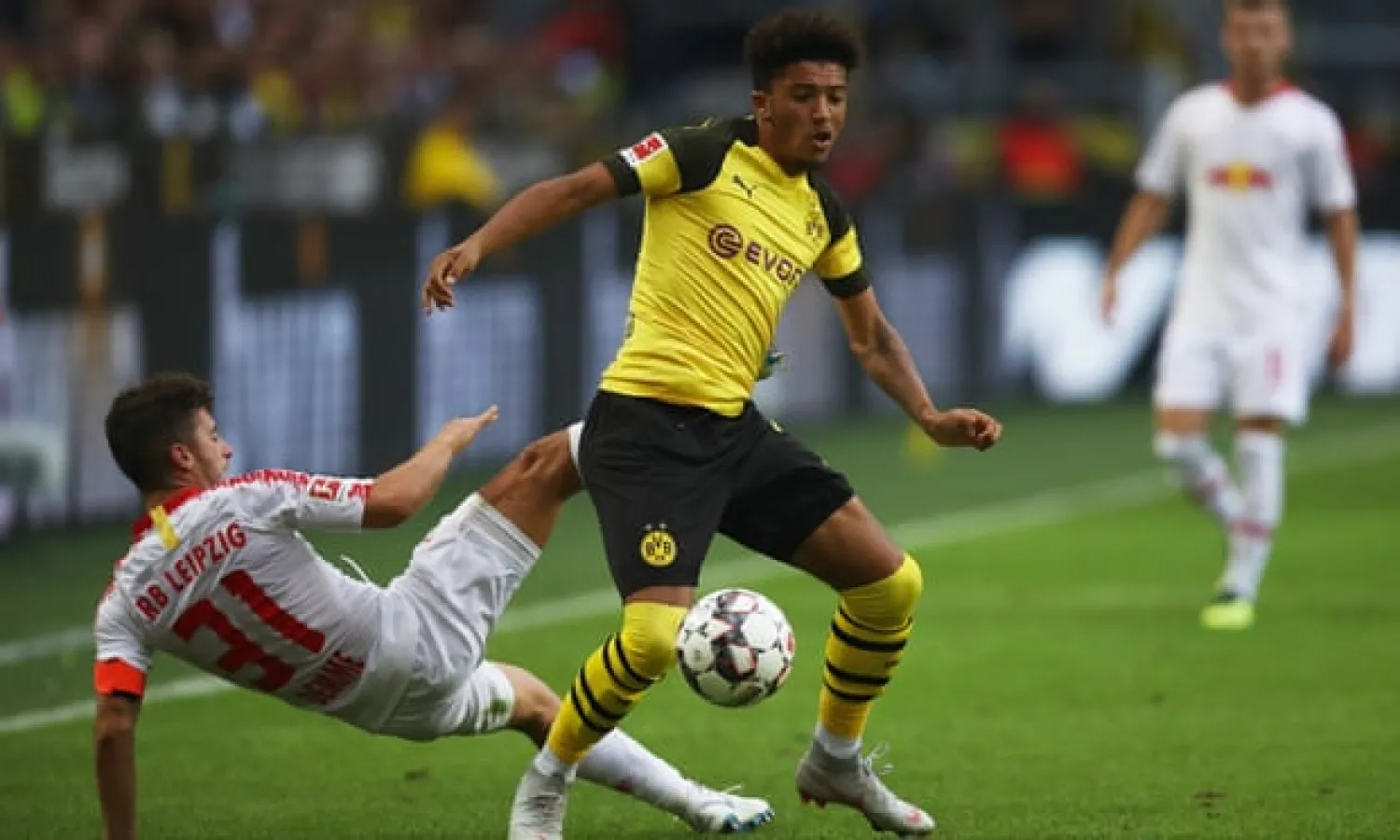Jadon Sancho is the street footballer who can become England’s Neymar, according to Dan Micciche, the 18-year-old’s former England youth coach.
Sancho left Manchester City for Borussia Dortmund just over a year ago in an effort to gain more game time. The move paid off: Sancho ended last season with 12 Bundesliga appearances and has come on as a substitute in all three matches for Lucien Favre’s side this term.
Micciche, a former MK Dons manager, coached Sancho at under‑15 and under-16 level for England and has no doubt about his potential. “Provided he doesn’t become restricted he could be our Neymar-type player – in terms of being unpredictable, playing on that left-hand side,” Micciche says. “And he’s flamboyant, entertaining to watch. But like Neymar he’s effective with it. In most games he’ll create something – it’s not a beauty contest. He’s not on the pitch flicking it over someone’s head for the sake of it.”
Sancho’s progress is marked by his having been in the shake-up for Gareth Southgate’s England squad this month. He was selected instead for Paul Simpson’s under-19s, playing in Wednesday’s 4-1 win over the Netherlands, and is in line to face Belgium on Monday. Micciche points to how the player’s talent has been carefully developed.
“Jadon did a lot of his learning on the street through informal play,” he says of the London-born Sancho, who joined Watford as a boy. “People think academies produce these players – they don’t. They do a lot of things – they support, develop, nurture. But they inherit 90%, 95% of the player, even when they join at nine. It’s about the other five, 10% – that can be crucial, as the player is either completed or the 90 shattered.
“The analogy I use is ‘bricks in the wall’. If 10 bricks are needed to make the structure and the player is the wall, when they come to you several bricks are in place and it’s about filling in the missing ones. With Jadon, if one of his bricks is creativity and you tell him he can only play one- or two-touch you take that brick away.
“What he brings to the table are ball skills – being able to play out of tight areas in a way where he can beat a player rather than having to pass it and he can do that a variety of ways. He can run with the ball at speed and go both sides.
“Even though he’s right-footed, when he’s dribbling at people on that left side he can actually go inside or outside and that makes him very difficult to defend against.
“At the very youngest age groups – nine, 10, 11 – it tends to be one-v-one attacking skills, 4-v-4, 5-v-5 futsal,” says Micciche. “Then at 12, 13, 14 we stick them on bigger pitches, 11-v-11, and it becomes about team shape and winning.”
When Micciche was with England he drew on his experience of coaching Dele Alli at MK Dons. “I did a lot of work around this and gave them examples of Dele – showed them footage of him at 11, with him talking over his journey.
“It wasn’t completely smooth. He [Alli] went through a stage in which he was getting knocked off the ball and we showcased the strategies we put in place to protect his creativity while he went through that.”
Micciche believes Sancho can emulate Alli. “First of all his mentality is strong – he’s gone from Watford to Man City, so moving up north – and then had the mentality to move to another country,” the 39-year-old says. “He’s travelled the world with club and country – that takes a lot of discipline, sacrifice. And he’s delivered on every stage he’s been put on, including now in Germany.”
Micciche believes Sancho is England’s brightest ball-playing prospect since Joe Cole. He says: “We haven’t had that Neymar, that type, and I think it’s because we haven’t supported those kinds, coaching-wise. We had people like Joe Cole but they haven’t become that top player.”
Micciche supports Sancho’s quest to develop overseas and cites Sheyi Ojo, the Liverpool forward he coached at MK Dons between under‑10 and under-15 level.
“He’s just gone to the French league,” Micciche says of the 21-year-old, who joined Stade de Reims on loan. “It’s a real education for young English players. The Premier League is such a global product now and managers get less and less time in their jobs so there’s less opportunities for our young players.
“In some case it doesn’t matter how good you are as you haven’t got 200 league appearances on your CV. Take, for example, [City’s] Bernardo Silva and Phil Foden. Similar players – but Silva is less of a risk.
“If they can go abroad and play in a top league then they’ll come back better players, if they do come back. If not then they may sign for one of the top clubs in that country.”
The Guardian Sport









